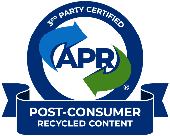33,000 Pounds of Waste Material Recycled at 2023 Cleveland Browns Home Games
PureCycle and the Cleveland Browns announced a partnership milestone after working together during 2023.
Orlando, Fla. – PureCycle Technologies, Inc. (Nasdaq: PCT) and the Cleveland Browns announced a partnership milestone after working together during the 2023 football season. Together, they recycled more than 33,000 pounds of plastic and aluminum at Browns home games through PureCycle’s PureZero™ waste program. The Browns also recycled more than 40,000 pounds of cardboard throughout 2023.
PureCycle CEO Dustin Olson said, “The Browns have been one of the best stories of the 2023 NFL season. We’re really pleased to see that their recycling efforts mirrored their strong 8-1 record at Cleveland Browns Stadium. Throughout our PureZero™ partnership they’ve shown a willingness to evolve. Aramark facilities and the Cleveland Browns Stadium Operations team did an incredible job in 2023 to improve their recycling efforts and help keep stadium waste from ending up in landfills and our waterways.”
As part of the PureZero™ program, the Browns implemented a multi-step approach to reduce the amount of plastic waste generated at the team’s home games.
Michele Powell, VP, Stadium Operations & Event Development, said, “We’re always looking for ways to enhance our sustainability efforts. The PureZero™ program and the team at PureCycle helped us to educate our fan base on what materials can be recycled and the postgame stadium pick for recyclables was a gamechanger this year.”
In 2023, Browns fans were encouraged to either throw their recyclable products in the appropriate bin or leave their used bottles, cans and other items in the seats at the end of the game. The stadium operations team then handpicked the stadium bowl for recyclables, which helped to lower contamination rates and increase the amount of recycled content that could be processed by Rumpke Waste & Recycling.
###
PureCycle Contact
Christian Bruey
cbruey@purecycle.com
+1 (352) 745-6120
About PureCycle Technologies
PureCycle Technologies LLC., a subsidiary of PureCycle Technologies, Inc., holds a global license for the only patented solvent-driven purification recycling technology, developed by The Procter & Gamble Company (P&G), that is designed to transform polypropylene plastic waste (designated as No. 5 plastic) into a continuously renewable resource. The unique purification process removes color, odor, and other impurities from No. 5 plastic waste resulting in an ultra-pure recycled (UPR) plastic that can be recycled and reused multiple times, changing our relationship with plastic. www.purecycle.com
Forward-Looking Statements
This press release contains forward-looking statements, including statements about the outcome of any legal proceedings to which PureCycle is, or may become a party, and the financial condition, results of operations, earnings outlook and prospects of PureCycle. Forward-looking statements generally relate to future events or PureCycle’s future financial or operating performance and may refer to projections and forecasts. Forward-looking statements are often identified by future or conditional words such as “plan,” “believe,” “expect,” “anticipate,” “intend,” “outlook,” “estimate,” “forecast,” “project,” “continue,” “could,” “may,” “might,” “possible,” “potential,” “predict,” “should,” “would” and other similar words and expressions (or the negative versions of such words or expressions), but the absence of these words does not mean that a statement is not forward-looking.
The forward-looking statements are based on the current expectations of the management of PureCycle and are inherently subject to uncertainties and changes in circumstances and their potential effects and speak only as of the date of this press release. There can be no assurance that future developments will be those that have been anticipated. These forward-looking statements involve a number of risks, uncertainties or other assumptions that may cause actual results or performance to be materially different from those expressed or implied by these forward-looking statements. These risks and uncertainties include, but are not limited to, those factors described in the section entitled “Risk Factors” in each of PureCycle’s Annual Report on Form 10-K for the fiscal year ended December 31, 2022 and PureCycle’s Quarterly Reports on Form 10-Q, those discussed and identified in other public filings made with the Securities and Exchange Commission by PureCycle and the following:
• PCT's ability to obtain funding for its operations and future growth and to continue as a going concern;
• PCT's ability to meet, and to continue to meet, applicable regulatory requirements for the use of PCT’s UPR resin (as defined below) in food grade applications (including in the United States, Europe, Asia and other future international locations);
• PCT's ability to comply on an ongoing basis with the numerous regulatory requirements applicable to the UPR resin and PCT’s facilities (including in the United States, Europe, Asia and other future international locations);
• expectations and changes regarding PCT’s strategies and future financial performance, including its future business plans, expansion plans or objectives, prospective performance and opportunities and competitors, revenues, products and services, pricing, operating expenses, market trends, liquidity, cash flows and uses of cash, capital expenditures, and PCT’s ability to invest in growth initiatives;
• the ability of PCT’s first commercial-scale recycling facility in Lawrence County, Ohio (the “Ironton Facility”) to be appropriately certified by Leidos (as defined below), following certain performance and other tests, and commence full-scale commercial operations in a timely and cost-effective manner;
• PCT’s ability to meet, and to continue to meet, the requirements imposed upon it and its subsidiaries by the funding for its operations, including the funding for the Ironton Facility;
• PCT’s ability to complete the necessary funding with respect to, and complete the construction of, (i) its first U.S. multi-line facility, located in Augusta, Georgia (the “Augusta Facility”); (ii) its first commercial-scale European plant located in Antwerp, Belgium and (iii) its first commercial-scale Asian plant located in Ulsan, South Korea, in a timely and cost-effective manner;
• PCT’s ability to sort and process polypropylene plastic waste at its plastic waste prep (“Feed PreP”)
facilities;
• PCT’s ability to maintain exclusivity under the Procter & Gamble Company (“P&G”) license (as described below);
• the implementation, market acceptance and success of PCT’s business model and growth strategy;
• the success or profitability of PCT’s offtake arrangements;
• the ability to source feedstock with a high polypropylene content at a reasonable cost;
• PCT’s future capital requirements and sources and uses of cash;
• developments and projections relating to PCT’s competitors and industry;
• the outcome of any legal or regulatory proceedings to which PCT is, or may become, a party including the securities class action case;
• geopolitical risk and changes in applicable laws or regulations;
• the possibility that PCT may be adversely affected by other economic, business, and/or competitive factors, including rising interest rates, availability of capital, economic cycles, and other macro-economic impacts;
• turnover or increases in employees and employee-related costs;
• changes in the prices and availability of labor (including labor shortages), transportation and materials,
including significant inflation, supply chain conditions and its related impact on energy and raw materials, and PCT’s ability to obtain them in a timely and cost-effective manner;
• any business disruptions due to political or economic instability, pandemics, armed hostilities (including the ongoing conflict between Russia and Ukraine and the current situation in Israel);
• the potential impact of climate change on PCT, including physical and transition risks, higher regulatory and compliance costs, reputational risks, and availability of capital on attractive terms; and operational risk.






-1.png)
